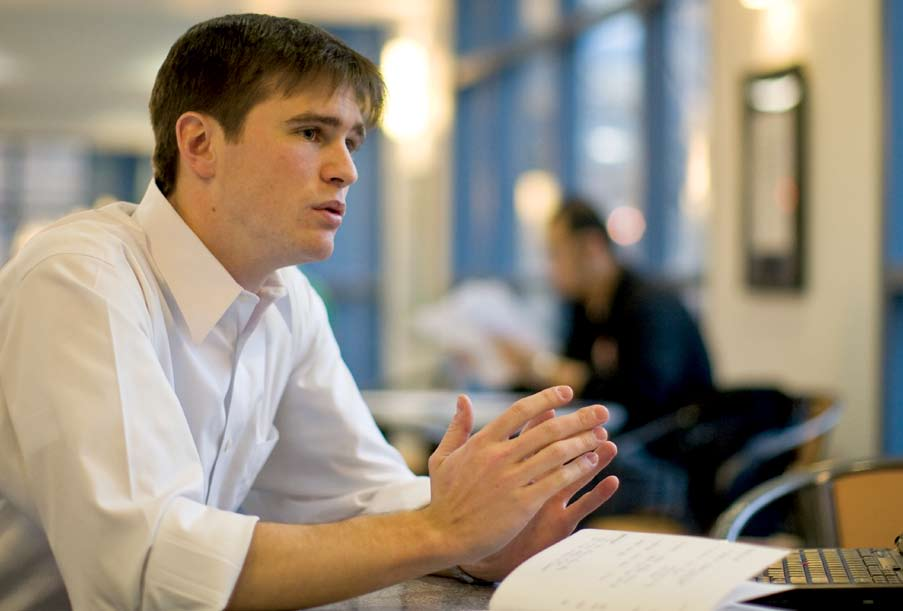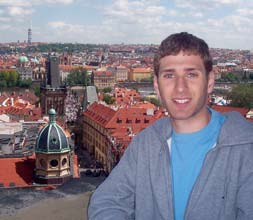In the 93 years since it was founded, Gannett Fleming Inc. has designed a wide variety of engineering systems, ranging from interstate highways and mass transit facilities to wastewater treatment and flood control.
In 2005, when the international consulting firm resolved to improve its method of controlling water loss from dams, it turned to Greg Bosch and four of his classmates in Lehigh’s undergraduate Computer Science and Business (CSB) program.
Gannett Fleming repairs dams by drilling large holes in the dams and filling them with grout, which expands and fills cracks as it dries. Before the grout is poured, engineers test the holes to assess the dam’s permeability. Once they are filled, the holes cannot be retested, and the only way to determine if additional columns of grout are needed is to drill more holes.
Drilling holes, says Bosch, can be expensive.
“The process is drill, test and fix. Once the hole is fixed you can’t test unless you drill another hole. It costs a lot to drill but very little to test and fix a hole.”
With help from a retired statistician, Bosch’s team designed a program to predict a dam’s permeability without additional drilling.
“The company could use the program to create a graph showing the permeability of a set of holes and a prediction, with a 90-percent confidence interval, of the dam’s permeability if they were to drill another set of holes,” says Bosch.
Bosch’s team wrote its software program as part of the yearlong CSB capstone project. All CSB students must complete the project by working for an outside sponsor company such as Volvo IT-North America, Just Born Candy or Air Products and Chemicals.
“The capstone project exposes students to the processes of a business environment,” says Dennis Praedin, director of the project management certificate program for Lehigh’s College of Business and Economics. “Ideally, the students will have something to turn over to the sponsor company.”
The dam project on which Bosch and his team worked was unusual. More often CSB students work with accounting firms, as Kyle Shapiro ’08 did during his 2006 summer internship in the Budapest branch of PricewaterhouseCoopers (PwC).
Shapiro and two of his classmates helped PwC comply with the Sarbanes-Oxley Act of 2002, which established higher standards in corporate accounting and financial controls.
Before Shapiro’s team arrived in Budapest, PwC ran a series of queries through a business software program to determine who had access to information. Because a single query could take 10 minutes, the entire process lasted hours or days.
In less than four weeks, the Lehigh students extracted the software’s database, downloaded it to a laptop computer, and wrote a Microsoft Access program that could run multiple queries at once. They reduced the entire process to minutes and presented their results to surprised company officials.
James Hall, the Peter E. Bennett Chair in the College of Business and Economics, spoke later with PwC’s hiring manager. “She told me the company had no idea that students could know so much about business and technology,” he says.
Each year, PwC grants a pair of internships to two CSB students, one abroad and one domestic. Shapiro will work in PwC’s audit department after graduation.
Bosch, who graduated in 2006, worked in KPMG’s audit department for a year and then returned to Lehigh to work on a master’s degree in computer science.
CSB graduates have enjoyed great success. Since the first class graduated in 2004, every student receiving a diploma has had a job or a position in graduate school lined up.
In fact, says Hall, who is co-director of the program, high-profile companies often compete to hire CSB students because they need employees who understand the overlap between business and technology.
“There has been tremendous demand at all levels of organization,” says Hall, “for people who understand that overlap.”
This demand became apparent to Edwin Kay, associate chair of computer science and engineering and CSB co-director, when he noticed that accounting firms were hiring his computer science students.
“Because they couldn’t find graduates with both good technical background and business background, they hired computer science students and trained them in business, or they hired business students and trained them in computer science,” says Kay.
CSB students have the potential to lead their organization, says Peter E. Bennett ’63, chairman and CEO of Liberty Partners, who endowed the program.
Shapiro, a Peter E. Bennett Scholar, hopes one day to give back to the program.
“I told my parents that, if I have enough money 30 to 40 years from now, I will endow a scholarship in their name.”


